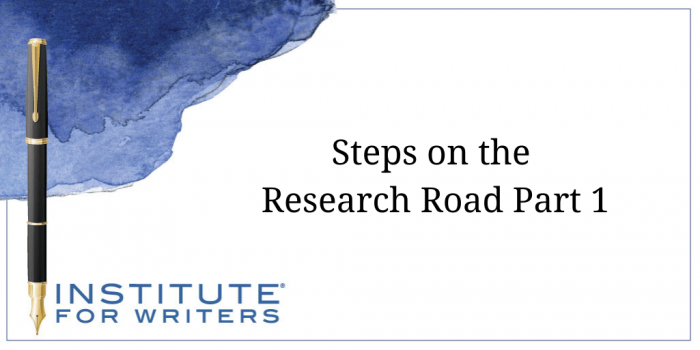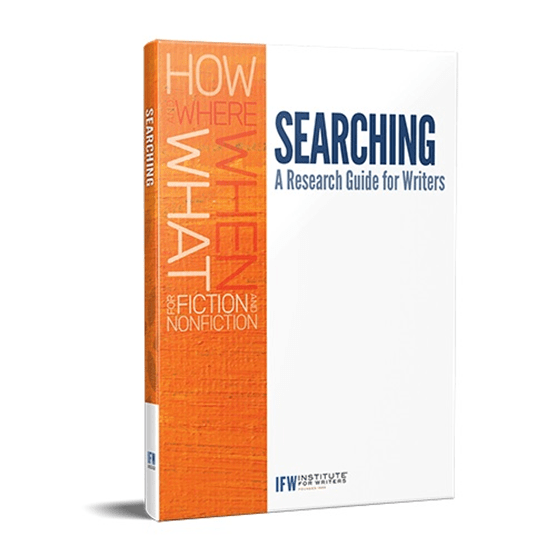1000 N. West Street #1200, Wilmington, DE 19801
© 2024 Direct Learning Systems, Inc. All rights reserved.

We teach our students how to write and get published!
View our Course Catalog >
Our October focus is research. Whether you’re writing fiction or nonfiction, research should be an integral part of your writing process. All of our October posts are adapted from IFW’s book Searching: A Research Guide for Writers.

Quality research is vital whether you write nonfiction or fiction, and whether you focus on books, articles, short stories, or novels. Author Susan Campbell Bartoletti, winner of a Newbery Honor and a Sibert Medal, asserts that in nonfiction you “must not invent.” And when writing fiction, thorough research lends veracity to your work.
Whether Bartoletti is writing nonfiction or fiction, she is an exacting researcher—so exacting that she even researches to be certain that the weather in her scenes is accurate. She says, “When I wrote my first historical novel, No Man’s Land, I made sure it rained when I said it rained because that novel followed the movement of an actual regiment, and for the sake of history it was important that even the weather was not invented. I did the same for my nonfiction book, Black Potatoes. For example, on page 104, I say it was a cold damp November day. I did not invent that fact. I looked it up.” This type of in-depth research helps a writer become exceptional. What follows will offer you the tools to be an expert researcher.
The first step in research is to find a topic about which you are curious. Perhaps you read something in the newspaper or heard a lecture that sparked your interest. Be sure that you have a passion for the topic because you will be spending plenty of time with it. You will likely work months on an article, and years if it is a book project. After choosing a topic, reference sources are the first research stop. Elizabeth Clarke, research services librarian at Marist College’s James A. Cannavino Library, says that reference sources such as encyclopedias give a solid overview of a topic and basic facts. It is possible to use top-notch encyclopedias, such as Encyclopedia Britannica and Oxford Research Encyclopedias, online with paid subscriptions. However, libraries frequently offer free access to these resources through their websites. Other examples of reference sources are: dictionaries, which help define terms; almanacs, which offer facts and figures; atlases, which contain maps; and bibliographic references, which have bibliographies organized by subject and are often annotated. Clarke suggests that reference sources are also a good way to familiarize yourself with pertinent vocabulary that can serve as keywords and search terms for online searches.
Many researchers begin with Wikipedia as an introduction to a subject. Realize, though, that anybody can contribute to Wikipedia, so at any given time its information can be unsubstantiated or biased. Therefore, it can act as a beginning point for research but never a final source.
Books can give an in-depth treatment of a topic. To locate applicable selections is only an online search away because libraries offer an Online Public Access Catalog (OPAC). Simply type keywords into the OPAC search and find applicable titles that the library has available. Often, you will want the most current information, so choose books with recent publication dates. From writing to publication, a book may take a year or more, which means the facts were written a year or more before the publication date. There is no sense in reading a book about modern beekeeping practices with a publication date of 1960 if you are researching cutting-edge apiary techniques. That being said, if you are writing a historical fiction book and one of your characters is a beekeeper in the 60’s, this would be the perfect resource for you.
As you read, you will find certain older books being cited over and over by experts, and these classic books should be included in your research. A wonderful source for older books is Project Gutenberg, www.gutenberg.org, which offers free access to entire texts with expired copyrights.
In his book The Oxford Guide to Library Research, Thomas Mann offers this insight: “The fact that books in research libraries are usually shelved by subject . . . gives researchers a major advantage in gaining subject access to their contents—one that, in many cases, cannot be matched by any computer searches, even if the same texts are available in electronic format.” Oftentimes, then, it is beneficial to browse the library stacks because you may find other useful books placed next to those you have located through online searching.
Research help can be found in many portions of a book. Granville Ganter, PhD, associate professor of English at St. John’s University, advises, “Pay attention to the bibliography at the end of books and articles. They are gold mines of research.” Avail yourself of others’ careful research by perusing bibliographies as well as footnotes and acknowledgements. There you can discover additional texts, the location of special collections connected to your subject, and experts to contact. In The Craft of Research, Wayne C. Booth and his colleagues mention that you can use Library of Congress subject headings, which are on the reverse of the title page, as keywords for online searches. In addition, the index will list exact page numbers where specific topics are discussed and save you from riffling through the entire book.
Many research opportunities are at your fingertips with the Internet. Plugging keywords into search engines such as Google or Bing can bring treasure troves of information. Meta search engines like Dogpile can search multiple search engines at once. Think critically about the trustworthiness of the websites you visit. The suffix of the website’s Universal Resource Locator (URL) gives a clue as to the site’s author. A government site has the suffix .gov, such as NASA.gov and the National Institutes of Health, nih.gov. The government sites are frequently reliable research options. The suffix for United States academic institutions is .edu, nonprofit organizations are frequently .org, and military websites are .mil. Commercial entities and individuals have websites ending in .com. Note that more and more, new suffixes are being created. Even cities are staking claim to their own suffixes, such as .nyc.
To uncover more specifics about the author of a website, there is usually an “About” tab or “Contact” link in the navigation bar or in the footer. Ask yourself about the credentials of the author and whether there are biases present. For example, if you are researching the best treatment methods for bipolar disorder and the site is filled with advertisements for a particular medicine, the contents of the site might be influenced by a pharmaceutical company. Rachel Carson, the renowned environmentalist, was critical of the sources she researched for her book Silent Spring. She was investigating the safety of the pesticide DDT and discovered that many of the academic studies attesting to the pesticide’s safety were paid for by chemical companies. Remuneration can also be hidden in plain sight by way of “affiliate” links, where the owner of the site is paid if a visitor clicks the link and then buys a product sold on that site. Any affiliate or reference links are, by law, supposed to be explained as such on the site.
There is much information that cannot be reached through search engines. This is when databases such as ProQuest and EBSCOhost come into play. Databases can be accessed at local, state, and academic libraries. The databases are often subject specific, which makes research easier. For example, PsychINFO has psychological material and Project MUSE focuses on the literary. With these databases, you can read peer-reviewed journal articles. Peer-reviewed articles have an added layer of vetting when compared to popular magazines and newspapers. An article sent to a peer-reviewed journal is distributed to scholars with expertise on that precise topic. The critiqued article is then returned to the author for revisions and possibly further research. This multiple-expert oversight makes peer-reviewed journals valuable resources.
Between books, online resources, and databases, there is a treasure trove of information waiting for you on the topic of your choice. Use these resources to add authenticity to your next article or book. Join us next week for part 2 of Steps on the Research Road for even more resources.
1000 N. West Street #1200, Wilmington, DE 19801
© 2024 Direct Learning Systems, Inc. All rights reserved.
1000 N. West Street #1200, Wilmington, DE 19801
© 2024 Direct Learning Systems, Inc. All rights reserved.
1000 N. West Street #1200, Wilmington, DE 19801
© 2024 Direct Learning Systems, Inc. All rights reserved.
1000 N. West Street #1200, Wilmington, DE 19801
© 2024 Direct Learning Systems, Inc. All rights reserved.

1000 N. West Street #1200, Wilmington, DE 19801
© 2025 Direct Learning Systems, Inc. All rights reserved.

1000 N. West Street #1200, Wilmington, DE 19801
©2025 Direct Learning Systems, Inc. All rights reserved. Privacy Policy.
4 Comments